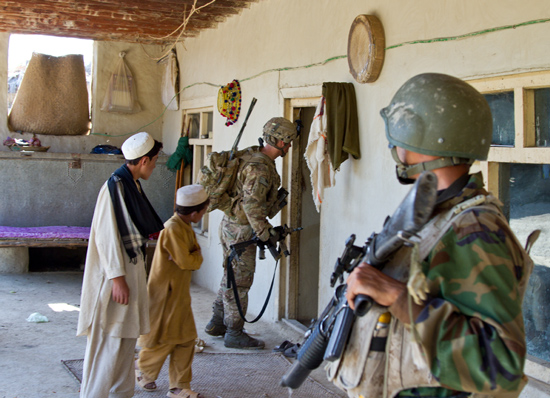 |
|
A US soldier searches a compound in the village of Majiles in Sabari district, Afghanistan. Photo by Bill Ardolino for The Long War Journal. |
I offer a lengthy analysis of the state of International Security Assistance Force (ISAF) strategy in eastern Afghanistan at Small Wars Journal, extrapolated from my August interviews and patrols conducted in Bagram, Khost City, and Sabari district. Highlights:
Despite the unique challenges of Afghanistan, American forces have proved that they can conduct successful counterinsurgency that shows tangible and potentially sustainable progress in the key southern provinces of Kandahar and Helmand with proper resources and strategy. But the US government’s recent commencement of a premature drawdown and its concurrent failure to supply necessary resources in the Afghan east, along with a high-level diplomatic failure to adequately address Pakistan’s support of the Afghan insurgency, has created fissures in strategy that may result in its failure.
Put more simply: effective counterinsurgency doctrine is more than the sum of its parts. And while current strategy that merges elements of COIN, including punishing offensive operations, with accelerated development of indigenous security forces may be making the absolute best of current resources, it remains inadequate to the task. US strategy in Afghanistan remains conflicted and lacks a clear path to success.
The Obama Administration’s announcement of a surge and COIN strategy in 2009, followed by commencement of withdrawal less than two years later, is an irresponsible policy. Tangible (and hard fought) gains in southern Afghanistan are now imperiled by a lack of resources in Regional Command East, and any reasonable analysis of Afghanistan – based on terrain and tribal heterogeneity alone – clearly forecasted that COIN would take longer than the unusually rapid example set by Iraq in 2006-2008.
Are you a dedicated reader of FDD's Long War Journal? Has our research benefitted you or your team over the years? Support our independent reporting and analysis today by considering a one-time or monthly donation. Thanks for reading! You can make a tax-deductible donation here.








4 Comments
USAID is about to put a big hole in the RC-East COIN campaign by ceasing construction of the Khost-Gardez Road.
It’s amost comedic: the USAID Afghanistan infrastricture department’s inability to make decisions has delayed the road by nearly a year. The contractor LBG has suffered from bad press, mismanagement at senior levels, the criminal acts of a former CEO and its failure to fire an Indian subcontractor who wasted months due to it’s own managerial inefficiency.
Prior to the surge the area was a hot bed of insurgent activity and the project was routinely attacked. Now with additional US and Afghan forces in the area, the conditions set militarily and the project about to complete within the next few months, USAID is pulling the plug.
It is possible to win COIN wars even when outnumbered. My data point; the Boer War.
This is a good example: http://regimentalrogue.com/duffersdrift/duffers_drift_dream1.htm
Detaining civilians who were suspect and even some unauthorized forced labor are perfectly usable tools, but the media has long since run out of control.
The RoE of these days are insane.
Still, even with more realistic methods of fighting this would still be really difficult and as mentioned in the article the premature drawdown and the diplomatic idiocy can not produce more than slight gain at best.
As for Obama I’m not impressed by his intelligence at all… from my superficial point of view at least it looks like he took a look at Iraq and thought ‘hmmm, that worked, so I guess I have to try it because it’s fancy, but just for a little.’
The RoE is allowing us to fail. With the results of the recent Loya Jiga decision to not allow night raids and detain Afghan citiziens under suspicion of terroristic acts, our ability to obtain human intelligence on IED and IDF cell structures and leadership will greatly deminish. This lack of information will in turn allow the freedom of movement desired by such cells in order to conduct attacks on CF. Additionally, adding to the RoE bit – The restrictions imposed to allow engagements to continue (after the Taliban have thrown down their weapons) only allows Taliban forces the opportunity to regroup and continue to attack at a later time. In doing so, you never really accomplish the goal of what war is really about. Its about destroying the enemy by attrition or by such means to render the enemy incapable of fighting. Allowing them to run away and fight again only stregthens their resolve, while our force continue to receive wounds from engagements or even, at times, killed in aciton. Mixing COIN operations within Green Zones, while trying to support the fabled Hearts and Minds campaign is, in my view, a waste of effort and lives, especially to a race of people who really just want us to leave.